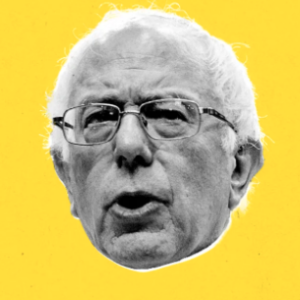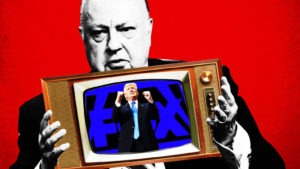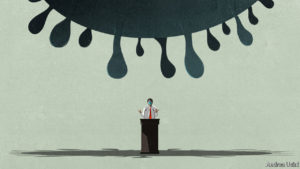 In the biggest crisis since WWII, humanity is mustering its forces against a very small, very formidable villain.
In the biggest crisis since WWII, humanity is mustering its forces against a very small, very formidable villain.
But this time, an organized global response has failed to arise. The U.N. Security Council is MIA. The G20 is in the hands of a murderous Saudi prince.
And Uncle Sam, once the great architect of Pax Americana, is ground zero for the losing side.
In charge is a guy who’s less like a president than one of those huge balloons with flailing arms outside a used car dealership. (1)
Covid the Un-connable
Just before the virus hit American shores, election-year partisanship was gearing up to fever pitch. The prez was busy staging rallies to get bong hits off his base. (2) He was feeling his odds were pretty good, psyching himself up for the game he knows best: the blood sport of political bullying.
But a couple of months later, America’s Re-Greatener is finding himself up against something he can’t con.
His self-contradictory pronouncements have been whipping back and forth like a balloon man in a windstorm. The lowest conceivable expectations anyone ever had of the man have proved optimistic. The result is chaos.
Warring camps
This being the USA, the chaos has broken down into warring camps.
[As a determiner of response to the pandemic,] Among Americans, partisanship has been a stronger predictor than age, gender, geography, even personal experience. — David Roberts
Polls reveal that MAGA folks are more skeptical of the crisis than the rest of the population. Hardly a surprise, since their hero is the poster boy for Dunning-Kruger syndrome, the overconfidence of the ignorant.
Meanwhile, his down-ticket lackeys are sweating in their boots, trying to figure out how to position themselves.  Their constituents are falling ill by the hour, but at this writing, eight GOP governors are boldly wrapping themselves in the states’-rights flag, refusing to mandate public health measures.
Their constituents are falling ill by the hour, but at this writing, eight GOP governors are boldly wrapping themselves in the states’-rights flag, refusing to mandate public health measures.
Florida’s Rick DeSantis says he’s taking his guidance “from the president’s demeanor.” (Not sure what you mean there, Rick. Orange and doughy?)
The chin-up-chest-out defiance of these public servants is informed by a sobering reality: despite everything, Trump’s popularity numbers are up. (3)
Jupiter crisis
The U.S. public’s response to the virus is a vivid example of what David Roberts calls an epistemic crisis: “[Americans] have become incapable of learning or knowing the same things,” he says.
Astrologers would call this not merely a Mercury issue — a disagreement about the accuracy of facts — but a Jupiter issue: a disagreement about the fundamental assumptions underlying the facts.
It’s Jupiterian in an ethical sense, too.
Just after the Equinox, we heard that a Texas politician seemed to be recommending that old folks volunteer to die so that the economy could be saved.
At first many of us figured this was a wicked joke. Some outrageous wag must be parodying late-stage capitalism in its final deranged extreme.
It wasn’t a joke. It was in fact late-stage capitalism in its final deranged extreme.
We’re seeing the darkest aspects of our national mindset in which market worship becomes a fucking death cult. — John Oliver
Life and death
In its shadow form, the conjunction of Jupiter (ideologies) and Pluto (life-and-death extremes) — now exact, for the first of three passes  — pushes partisan thinking into crazy land. Advocates cling to their viewpoint like a life raft in a shipwreck.
— pushes partisan thinking into crazy land. Advocates cling to their viewpoint like a life raft in a shipwreck.
Now, of course, the life-and-death extremes are literally so.
But the intensity of this conjunction can express itself in any number of ways. It helps to remember this.
It is showing up on a collective level as a descent into mortal peril. But that doesn’t mean we, as individuals, have to get lost in the storm.
Common sense
As the 2020 transits play out, we’re being challenged to stay grounded in realism and common sense (Capricorn). This means questioning societal  assumptions about what’s real and important.
assumptions about what’s real and important.
For three years now, Americans have been pumping our vital energy into the Cheeto-in-Chief — either reacting against his vicious idiocies or defending them, with equal fervor.
At this point, it’s barely even a war between individuals or ideas any more. It seems to be just about which of the two teams you identify with.
Wrestling match
Binary thinking, that great dampener of human intelligence, is a universal phenomenon. But American politics, a winner-take-all duopoly, takes it to an absurd extreme.
Election years epitomize the binary model in its brute-force simplicity. With the corporate news egging us on, all eyes are glued to the sweaty, thumping, monotonous wrestling match between the two major parties. We’re wedged into a corner, cheering our candidate until we’re hoarse.
There’s no room to think.
If we relied on our own instincts, wouldn’t we go with the candidate whose ideas were the most decent and sane? If we saw a sociopath in the Oval Office, would we care what side he was on?
 Berniphobia
Berniphobia
It looks like Bernie Sanders has been shafted again by the Democratic establishment.
The primaries revealed that the reason most anti-Trump voters went for Biden was worries about “electability” (I’m not sure what that really means, but I think it’s something along the lines of What’s everybody else wearing?). (4)
Among the one-per-centers in the Democratic party, Berniphobia is not so complicated. These folks worry that their portfolios might suffer a fraction of a percentage point were the country to shift towards social democracy. (5) Some have admitted that they’d rather vote for the detested incumbent than go with Bernie’s FDR-style progressivism.
The mainstream media — the kind that professes to be neutral — joined forces with the rightwing media to smear Bernie as a wild-eyed lunatic. The DNC made the decision, as it has in many a disastrous election before now (Hillary, Kerry, Mondale), to go with the “safe” candidate.
Except Biden isn’t safe at all.
Pre-insane times
Uncle Joe was branded as familiar and inoffensive, a return to pre-insane times. His association with Obama, touted to the point of self-parody, gained him the African American vote in the southern primaries, despite his history of making dog-whistle statements like this:
We are all too familiar with the stories of welfare mothers driving luxury cars and leading lifestyles that mirror the rich and famous. Whether they are exaggerated or not, these stories underlie a broad social concern that the welfare system has broken down—that it only parcels out welfare checks and does nothing to help the poor find productive jobs. – Sen. Joe Biden, 1988
Early in the campaign, Bernie’s Democratic rivals eagerly joined the corporate media chorus, calling his ideas “unrealistic.”
That great mantra of Bernie-bashing, “How would we pay for it?” has been on so many lips recently that you’d think it would have inspired somebody, somewhere in the straight media to mention the hundreds of billions that go annually to military spending without eliciting a whimper of complaint. But that topic seems to be part of a mysterious pledge of silence that anchor-folk have to swear before they get fitted with a microphone.
Sam Bee did a great expose on the F-35 aircraft that we taxpayers paid 115 million bucks a pop for. It was so poorly built, it failed to take off.
Our huge defense establishment has failed to actually defend America against any of the biggest assaults on our system in past decades — from the 9/11 attacks to Hurricanes Katrina and Sandy to the chronic wildfires in California to the new pandemic. — Jefferson Morley
Doesn’t it make you wonder what policies would get the thumbs-up if we used the criteria of cost-effectiveness and public benefit?
Health is trending
Of all the progressive causes identified with Sanders, it was Medicare-for-all that raised the loudest chorus of sneers.
Until the bug arrived.
 Until a few weeks ago — a million years, in COVID time — the public conversation about poverty in the USA was shallow at best, not least among liberals with good health insurance.
Until a few weeks ago — a million years, in COVID time — the public conversation about poverty in the USA was shallow at best, not least among liberals with good health insurance.
Everybody was too focused on that morning’s wankings of the septuagenarian toddler in the White House. Nobody was addressing income inequality on the level of serious policy but Liz Warren and The Squad.
And Bernie Sanders, who’s been addressing it seriously, pragmatically, and unflinchingly for forty years.
A human right
Income inequality was once a topic at the margins of cultural debate. But over the past three decades, since “trickle-down” was inaugurated under Reagan, we’ve gotten to the point where four out of five Americans subsist paycheck to paycheck. That’s a lot of people, living with the knowledge that falling seriously ill would ruin them. You’d think it would have incited a revolution by now.
But it was made into a partisan talking point. A humanitarian crisis that far outstripped politics was grabbed  hold of by politics.
hold of by politics.
And politics brought the media on board. Through the evil genius of minds like Roger Ailes, we ended up with the great irony of the “populist wave,” whereby the demographic most imperiled by the lack of a social safety net was the very demographic most likely to watch Fox news, where they heard that universal health care was a socialist plot.
Thus arose the grotesque paradox of Trump voters resorting to GoFundMe to pay for their cancer treatments while still railing against “Obamacare.”
All bets are off
After Trump took office, American partisanship consolidated further and further. Each side’s cards were neatly laid out on the table.
And then the meteor hit.
 Covid-19 has up-ended the way things have been run for decades. The usual political and economic priorities have been tossed up in the air like the deck of cards in Alice in Wonderland.
Covid-19 has up-ended the way things have been run for decades. The usual political and economic priorities have been tossed up in the air like the deck of cards in Alice in Wonderland.
The plutocrats have had the wind knocked out of them by the stock market crash. The conventional media is too shocked to stuff the pandemic into sound bites. The phalanx of yes-men who surround the president are stumbling through a game of musical chairs, waiting to see who will be fired next.
None of these forces have sat down to work out a strategy. And in the absence of a plan to spin the disaster, the patently obvious is rearing its head: Bernie was right, and he’s the only one with a vision equal to the scale of what’s happening.
As for “Who’s going to pay for it?,” we haven’t heard it much in regards to the two-trillion dollar bailout.
Change ain’t looking for friends. Change calls the tune we dance to.– Al Swearengen, Deadwood
Change frightens people. In an ordinary election year, candidates and voters tend to “move towards the middle.”
But this is not an ordinary election year, nor an ordinary moment in history.
Naomi Klein has written about how the political class has used social catastrophes to create policies that allow for private plunder. … But she has also written that, in each of these moments, there are also opportunities for ordinary people to transform their conditions in ways that benefit humanity. — Keeanga-Yamahtta Taylor
There are several planetary cycles beginning this year. This gives a lot of oomph to new starts. When a society is cracked open, change finds a foothold.
But change doesn’t originate on the group level; it starts with us, as individuals. It works its genius when we allow ourselves to think outside the narrative. At a safe distance from the hive mind, we reconnect with our own unique histories, talents, values and foibles.
We stay aware of the public conversation, but our primary allegiance is to our own instincts. Astrologically speaking, this means honoring our birth chart: that record of our soul’s intention to be alive right now. This is how we show up for this critical world moment, and live a life we can be proud of.
Notes
1 Insult compliments of the king of scathe, Bill Maher.
2 Stephen Colbert.
3 In severe crises, leaders tend to rise in popularity everywhere, even in kakistocracies.
4 When reporters would ask Mayor Pete whether a gay candidate was electable. he’d say something along the lines of, “I guess we’ll see. Isn’t that the point of holding elections?”
5 The very rich are incongruously tight-fisted, as a class. Poor and middle-class Americans donate a greater percentage of their wealth than billionaires do. Case in point: Mark Zuckerberg’s recent 25 million-dollar donation to COVID research. This amounts to .045% of his wealth. Come to that, why does he get naming rights to San Francisco’s public hospital, after kicking in only 7% of the overall cost? Shouldn’t it be named after the other 93% of the funders, and be called, well, the San Francisco public hospital?

